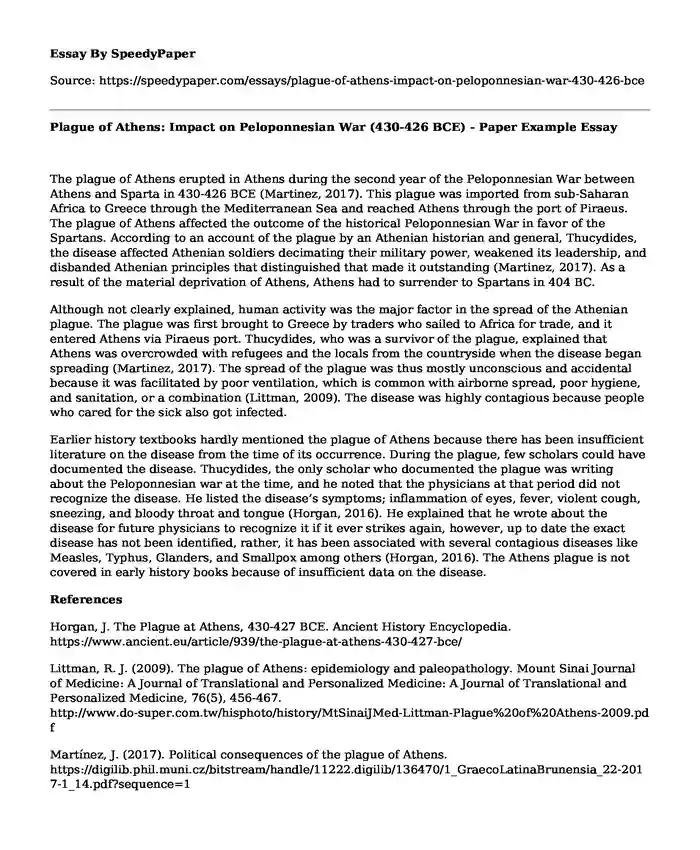
| Type of paper: | Essay |
| Categories: | Ancient history |
| Pages: | 2 |
| Wordcount: | 465 words |
The plague of Athens erupted in Athens during the second year of the Peloponnesian War between Athens and Sparta in 430-426 BCE (Martinez, 2017). This plague was imported from sub-Saharan Africa to Greece through the Mediterranean Sea and reached Athens through the port of Piraeus. The plague of Athens affected the outcome of the historical Peloponnesian War in favor of the Spartans. According to an account of the plague by an Athenian historian and general, Thucydides, the disease affected Athenian soldiers decimating their military power, weakened its leadership, and disbanded Athenian principles that distinguished that made it outstanding (Martinez, 2017). As a result of the material deprivation of Athens, Athens had to surrender to Spartans in 404 BC.
Although not clearly explained, human activity was the major factor in the spread of the Athenian plague. The plague was first brought to Greece by traders who sailed to Africa for trade, and it entered Athens via Piraeus port. Thucydides, who was a survivor of the plague, explained that Athens was overcrowded with refugees and the locals from the countryside when the disease began spreading (Martinez, 2017). The spread of the plague was thus mostly unconscious and accidental because it was facilitated by poor ventilation, which is common with airborne spread, poor hygiene, and sanitation, or a combination (Littman, 2009). The disease was highly contagious because people who cared for the sick also got infected.
Earlier history textbooks hardly mentioned the plague of Athens because there has been insufficient literature on the disease from the time of its occurrence. During the plague, few scholars could have documented the disease. Thucydides, the only scholar who documented the plague was writing about the Peloponnesian war at the time, and he noted that the physicians at that period did not recognize the disease. He listed the disease’s symptoms; inflammation of eyes, fever, violent cough, sneezing, and bloody throat and tongue (Horgan, 2016). He explained that he wrote about the disease for future physicians to recognize it if it ever strikes again, however, up to date the exact disease has not been identified, rather, it has been associated with several contagious diseases like Measles, Typhus, Glanders, and Smallpox among others (Horgan, 2016). The Athens plague is not covered in early history books because of insufficient data on the disease.
References
Horgan, J. The Plague at Athens, 430-427 BCE. Ancient History Encyclopedia. https://www.ancient.eu/article/939/the-plague-at-athens-430-427-bce/
Littman, R. J. (2009). The plague of Athens: epidemiology and paleopathology. Mount Sinai Journal of Medicine: A Journal of Translational and Personalized Medicine: A Journal of Translational and Personalized Medicine, 76(5), 456-467. http://www.do-super.com.tw/hisphoto/history/MtSinaiJMed-Littman-Plague%20of%20Athens-2009.pdf
Martínez, J. (2017). Political consequences of the plague of Athens. https://digilib.phil.muni.cz/bitstream/handle/11222.digilib/136470/1_GraecoLatinaBrunensia_22-2017-1_14.pdf?sequence=1
Cite this page
Plague of Athens: Impact on Peloponnesian War (430-426 BCE) - Paper Example. (2023, Nov 15). Retrieved from https://speedypaper.com/essays/plague-of-athens-impact-on-peloponnesian-war-430-426-bce
Request Removal
If you are the original author of this essay and no longer wish to have it published on the SpeedyPaper website, please click below to request its removal:
- Trump and Jackson - Comparison Essay Sample
- Research Paper on Impact of Historical Events on the Economy of the U.S.
- Free Essay. the Role of the Commanders of the Union Military in Freeing Slaves
- Essay Example. Becoming Mexican American by George Sanchez
- Egypt Is a Gift of the Nile - Paper Example
- Free Essay - The History of US Law Enforcement
- Essay Sample on Causes for South's Defeat in the Civil War
Popular categories




